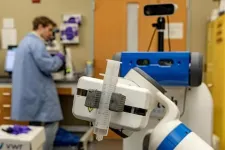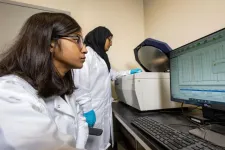(Press-News.org) Science laboratories across disciplines—chemistry, biochemistry and materials science—are on the verge of a sweeping transformation as robotic automation and AI lead to faster and more precise experiments that unlock breakthroughs in fields like health, energy and electronics, according to UNC-Chapel Hill researchers in the paper, “Transforming Science Labs into Automated Factories of Discovery,” published in Science Robotics, the most prestigious journal covering robotics research.
“Today, the development of new molecules, materials and chemical systems requires intensive human effort,” said Dr. Ron Alterovitz, senior author of the paper and Lawrence Grossberg Distinguished Professor in the Department of Computer Science. “Scientists must design experiments, synthesize materials, analyze results and repeat the process until desired properties are achieved.”
This trial-and-error approach is time-consuming and labor-intensive, slowing the pace of discovery. Automation offers a solution. Robotic systems can perform experiments continuously without human fatigue, significantly speeding up research. Robots not only execute precise experimental steps with greater consistency than humans, they also reduce safety risks by handling hazardous substances. By automating routine tasks, scientists can focus on higher-level research questions, paving the way for faster breakthroughs in medicine, energy and sustainability.
“Robotics has the potential to turn our everyday science labs into automated ‘factories’ that accelerate discovery, but to do this, we need creative solutions to allow researchers and robots to collaborate in the same lab environment,” said Dr. James Cahoon, a co-author of the paper and chair of the Department of Chemistry. “With continued development, we expect robotics and automation will improve the speed, precision and reproducibility of experiments across diverse instruments and disciplines, generating the data that artificial intelligence systems can analyze to guide further experimentation.”
The researchers defined five levels of laboratory automation to illustrate how automation can evolve in science labs:
Assistive Automation (A1): At this level, individual tasks, such as liquid handling, are automated while humans handle the majority of the work.
Partial Automation (A2): Robots perform multiple sequential steps, with humans responsible for setup and supervision.
Conditional Automation (A3): Robots manage entire experimental processes, though human intervention is required when unexpected events arise.
High Automation (A4): Robots execute experiments independently, setting up equipment and reacting to unusual conditions autonomously.
Full Automation (A5): At this final stage, robots and AI systems operate with complete autonomy, including self-maintenance and safety management.
The levels of automation defined by the researchers can be used to assess progress in the field, help in establishing appropriate safety protocols and set goals for future research in both science domains and robotics. Although lower levels of automation are common today, achieving high and full automation is a research challenge that will require robots capable of operating across different lab environments, handling complex tasks and interacting with humans and other automation systems seamlessly.
Artificial intelligence plays a key role in advancing automation beyond physical tasks. AI can analyze vast datasets generated by experiments, identify patterns and suggest new compounds or research directions. Integrating AI into the laboratory workflow will allow labs to automate the entire research cycle—from designing experiments to synthesizing materials and analyzing results.
In AI-driven labs, the traditional Design-Make-Test-Analyze (DMTA) loop can become fully autonomous. AI could determine which experiments to conduct, make real-time adjustments, and continuously improve the research process. While AI systems have shown early success in tasks like predicting chemical reactions and optimizing synthesis routes, the researchers caution that AI must be carefully monitored to avoid risks, such as the accidental creation of hazardous materials.
Transitioning to automated labs presents significant technical and logistical challenges. Laboratories differ widely in their setups, ranging from single-process labs to large, multiroom facilities. Developing flexible automation systems that work across diverse environments will require mobile robots capable of transporting items and performing tasks across multiple stations.
Training scientists to work with advanced automation systems is equally important. Researchers will not only need to develop expertise in their scientific fields but also understand the capabilities of robots, data science and AI to accelerate their research. Educating the next generation of scientists to collaborate with engineers and computer scientists will be essential for realizing the full potential of automated laboratories.
“The integration of robotics and AI is poised to revolutionize science labs,” said Angelos Angelopoulos, a co-author of the paper and research assistant in Dr. Alterovitz’s Computational Robotics Group. “By automating routine tasks and accelerating experimentation, there is great potential for creating an environment where breakthroughs occur faster, safer and more reliably than ever before.”
The research paper is available online in the journal Science Robotics at: https://www.science.org/doi/10.1126/scirobotics.adm6991
END
Study: Robotic automation, AI will speed up scientific progress in science laboratories
2024-10-23
ELSE PRESS RELEASES FROM THIS DATE:
Paleontologists discover Colorado ‘swamp dweller’ that lived alongside dinosaurs
2024-10-23
A team of paleontologists working near Rangely, Colorado, has uncovered a new (or, more accurately, very old) state resident—a fossil mammal about the size of a muskrat that may have scurried through swamps during the Age of Dinosaurs.
The researchers, led by the University of Colorado Boulder’s Jaelyn Eberle, published their findings Oct. 23 in the journal PLOS ONE.
Eberle and her colleagues named their discovery, which they identified from a piece of jawbone and three molar teeth, Heleocola piceanus. The animal lived in Colorado roughly 70 to 75 million years ago—a time when a vast inland sea covered ...
Repeated COVID vaccines enhance mucosal immunity against the virus
2024-10-23
Ghent, October 24, 2024 – During the COVID pandemic, many of us have received multiple mRNA vaccines. New work by researchers at the VIB-UGent Center for Inflammation Research, Ghent University, and University Hospital Ghent, among others, has found that such repeated vaccinations lead to the presence of mucosal antibodies, for example, inside the nose. Their work appears in Science Translational Medicine.
Protective booster shots
Part of the global response strategy against the COVID pandemic involves the administration of booster shots, or ‘vaccine updates’ to ensure ...
MD Anderson expands arts experience program to enhance healing and well-being for patients
2024-10-23
HOUSTON ― As part of its ongoing commitment to patient comfort and healing, The University of Texas MD Anderson Cancer Center today announced a new focus on art to support the revitalization and expansion of its clinical facilities. This initiative will include the creation of a multisensory healing environment in both public spaces and patient care areas that are designed to prevent disease, promote health and foster well-being.
This transformative project aims to enhance every aspect of the patient experience, reinforcing MD Anderson's dedication to comprehensive ...
Students at Historically Black Colleges and Universities (HBCUs) face barriers to medical school admission, study finds
2024-10-23
CHAPEL HILL, N.C. – There are 45.3 million African Americans living in the United States and they represent 13.6 percent of the U.S. population, according to the U.S. Census Bureau. But only 5.7 percent of physicians in the United States self-identify as Black, despite multiple efforts over many years to increase the number of Black doctors.
A new study led by Jasmine Weiss, MD, MHS, FAAP, assistant professor of pediatrics in the UNC School of Medicine, describes the barriers to medical school admission that students at Historically Black Colleges and ...
Symbiosis in ancient Corals
2024-10-23
Coral reefs rank among the most biodiverse habitats on Earth and are often referred to as the rainforests of the sea. Modern reef building corals evolved in the Triassic Period around 250 million years ago. They can live in symbiosis with tiny organisms, often algae, that can carry out photosynthesis. This photosymbiosis is particularly beneficial in nutrient-poor waters because it helps the corals to recycle scarce nutrients.
Geological evidence reveals that corals already existed in the Devonian period, over 385 million ...
Researchers receive grant to study invasive autumn olive
2024-10-23
Almost a ubiquitous presence in landscapes across Southwest Virginia, the invasive autumn olive thrives.
But it’s not supposed to be here.
Autumn olive is known for its nitrogen-fixing ability, allowing it to thrive in poor soils and outcompete native plants. The shrub’s berries are edible, rich in antioxidants such as lycopene, and have a tart-sweet flavor. While its berries are beneficial for wildlife, the plant's aggressive spread disrupts local ecosystems, reducing biodiversity.
With a one-year grant from the Powell River ...
New research shows urine tests may detect early diseases
2024-10-23
Early detection is critical when it comes to curing diseases like cancer, but not everyone has easy access to screening tools. For problems in the genitourinary (GU) tract (which includes the kidneys, prostate, and bladder), health providers usually use a combination of screening tools, including blood tests, imaging, and physical examinations. Scientists are now working on an even simpler tool for screening illnesses before they become a problem – urine analysis.
According to a new study from scientists at The University of Texas at Arlington, Chan-Zuckerberg Biohub, and Stanford University, ...
Antibiotics and antifungals may slightly affect Parkinson's risk, study finds
2024-10-23
A Rutgers Health study has found that people who took multiple courses of penicillin antibiotics had a modestly lower risk of developing Parkinson's disease, a surprising finding that researchers say highlights the complex relationship between bacteria in the digestive tract and brain health.
The study, published in Parkinsonism & Related Disorders, analyzed medical records from more than 93,000 people in the United Kingdom. Researchers found that those who received five or more courses of penicillin antibiotics in the five years before diagnosis had about a 15% lower risk of Parkinson's compared with those ...
Nixing narcolepsy nightmares
2024-10-23
Nightmares affect 30-40% of patients with narcolepsy, but are often overlooked
Treatment can transform patients’ sleep and their daytime mood in a matter of weeks
Study found overall reduction in nightmare severity and frequency in six patients
CHICAGO --- A new Northwestern Medicine study has demonstrated a new way to treat narcolepsy-related nightmares.
The scientists combined cognitive behavioral therapy (CBT) and lucid dreaming to help patients in a small clinical trial.
“We had them imagine what they’d like to dream instead of their nightmare, almost like they’re writing a movie script,” said corresponding author ...
Mass General Brigham selected to receive $3.29 million award from ARPA-H’s Sprint for Women’s Health
2024-10-23
Mass General Brigham has been selected by the Advanced Research Projects Agency for Health (ARPA-H) as an awardee of the Sprint for Women’s Health to address critical unmet challenges in women’s health, champion transformative innovations, and tackle health conditions that uniquely or disproportionately affect women. Mass General Brigham will receive $3.29 million in funding over two years through the Sprint for Women’s Health spark track for early-stage research efforts.
Understanding and improving sleep is especially important for women, who face a higher risk of neurodegenerative diseases ...




